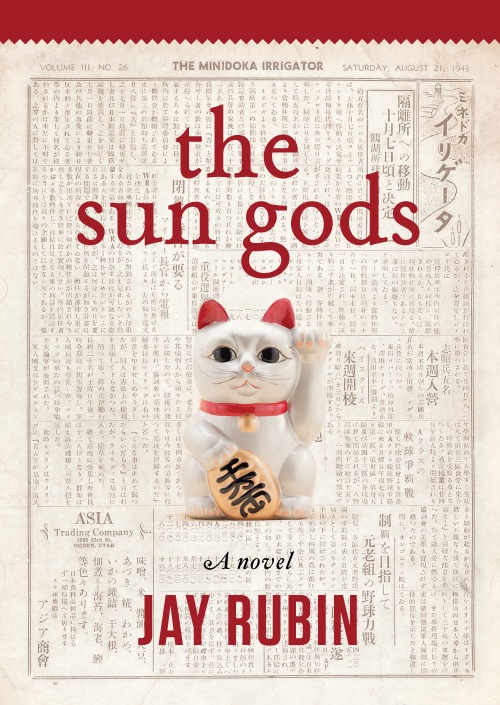The Sun Gods (book)
Creators: Jay Rubin
Novel by Jay Rubin set in Seattle and that involves wartime incarceration at the Minidoka , Idaho, concentration camp.
Japanese literary scholar and translator Jay Rubin's The Sun Gods tells two separate linked narratives, one taking place just before and during World War II and the other twenty years later. In the late 1930s, Reverend Thomas Morton is a young widower with a toddler son and an enthusiastic English language pastor of a Japanese Christian church when he is swept off his feet by the newly arrived sister of a regular member of the congregation. Mitsuko forms an instant and mutual bond with Morton's son, Billy, and he hires her as a babysitter. She soon moves into his home, and love and marriage inevitably ensue. But Morton finds himself drawn into the ominous reports of Japanese military aggression in Asia and begins to absorb the anti-Japanese sentiment permeating the larger American society, straining the marriage. By the time his congregation is forcibly removed and sent to American concentration camps, Morton has largely abandoned Mitsuko and Billy, who refuses to leave his stepmother's side. The other story picks up with an adult Billy attending a religious college in the late 1950s and finding himself oddly drawn to Japanese culture, despite his father's harsh renunciation of all things Japanese. A strange Nisei man who seems to know him begins to open the doors to his mysterious past.
Jay Rubin (1941– ) is a literary scholar and translator best known for his translations of the works of Haruki Murakami. The Sun Gods was his first novel, published when he was in his early seventies. But he told interviewer Nikkitha Bakshani that he actually wrote the book some thirty years earlier, at which time he was unable to interest any literary agents or publishers. After moving to the Seattle area in retirement from Harvard University, where he had been teaching (before that, he had taught at the University of Washington), he submitted the manuscript to Seattle based Chin Music Press, who eventually published the book. [1]
Reviews were mixed, with some reviewers admiring the subject matter and themes, while others found the character development and plot to be wanting.
While The Sun Gods is well researched and the scenes in Minidoka mostly conform to what is known, the two shootings of inmates by guards at Minidoka are inventions of the author.
Might also like: Hotel on the Corner of Bitter and Sweet by Jamie Ford; Southland by Nina Revoyr; After the Bloom by Leslie Shimotakahara
Footnotes
- ↑ Nikkitha Bakshani, "The Rumpus Interview with Jay Rubin", The Rumpus , July 8, 2015, accessed on February 17, 2017 at http://therumpus.net/2015/07/the-rumpus-interview-with-jay-rubin .
| Author | Jay Rubin |
|---|---|
| Pages | 361 |
| Publication Date | 2015 |
For More Information
Publisher website: http://store.chinmusicpress.com/product/the-sun-gods .
Reviews
Kirkus Reviews , June 2, 2015. ["This novel arrives with an impressive pedigree; in addition to translating Murakami, Rubin... is a scholar of Japanese literature who has taught at Harvard. So readers might be surprised at the heavy-handedness and lack of nuance in his fiction, which suffers from undeveloped characters, maudlin dialogue, and a contrived plot."]
Maloney, Iain. " Legendary Translator Jay Rubin's Novel 'The Sun Gods' Evokes Horror of Internment Camps. " Japan Times , May 9, 2015. ["'The Sun Gods' is surprising, heartbreaking and powerful. At a time when Japan is being pushed on all sides to confront its history, this novel is a welcome reminder that when it comes to war, no one holds the moral high ground."]
McMichael, Barbara Lloyd. " 'The Sun Gods': Love and War in World War II-era Seattle. " Seattle Times , May 10, 2015. ["But the story’s most perplexing character, Pastor Tom, is sketched in fairly broad strokes. This is the letdown — that we cannot gain better insight into this man’s breach of faith."]
Niiya, Brian . Densho Blog, Oct. 13, 2015. ["... by turns cloying, manipulative, and affecting."]
Shank, Megan. " Childhood Revisionism. " Los Angeles Review of Books , May 27, 2015. ["But overall, the characters are nuanced and humane, and the rich themes and vivid setting make The Sun Gods an immensely rewarding read."]
